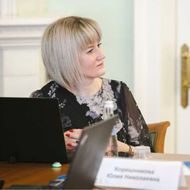Project Team of ‘Success and Self-Sustainability of the Individual in a Changing World’ Wins Russian Science Foundation Grant

Researchers from HSE University will receive funding from the Russian Science Foundation to study such forms of student employment as freelancing, self-employment, and entrepreneurship, all of which have been actively developing in recent years. The research will shed light on the new opportunities and challenges encountered by students and early-career specialists in the labour market. It will also aid in the development of effective strategies for their successful adaptation and development.
Changes in the world and the labour market mean that early-career specialists need have new skills, such as the ability to act without specific instructions and to make decisions independently. These competencies are grouped under terms such as ‘agency’, ‘independence’, ‘proactivity’, ‘initiative’, ‘entrepreneurial spirit’, etc, and are widely studied in Russia and abroad.
The increased focus on this topic is the result of changes in the economy and society, a phenomenon sometimes referred to in sociology circles as ‘destructuring’. In the labour market, this manifests as a growth in the popularity of alternative forms of work alongside traditional corporate employment. These alternative forms include platform work, freelancing, entrepreneurship, etc. In addition, so-called ‘corporate entrepreneurship’ is increasingly sought after in organisations.
However, scientists and practitioners do not fully agree on which qualities a person should have in order to be successful in new employment circumstances, nor how to develop these qualities.

In order to address these challenges, researchers from HSE University will study the trajectories of students and graduates of higher education in new social and economic conditions, assess the role of education in forming and supporting non-traditional forms of employment, and examine the characteristics that contribute to productive forms of agency. All of this will be done as part of the strategic project 'Success and Self-Sustainability of the Individual in a Changing World' implemented as part of the Priority 2030 programme.

Head of the Laboratory for Human Capital and Education Research at the HSE University Institute of Education and head of the research project
‘Research into non-traditional forms of employment among students has major significance in modern society, where technology—and digitalisation especially—is changing the traditional models of business processes. The results of this research can shed some light on new the new opportunities and challenges facing students and early-career specialists, as well as help to develop effective strategies for their successful adaptation and development. I am confident that this research will produce valuable theoretical and practical results.’
Yulia Koreshnikova, supervisor of the strategic project 'Success and Self-Sustainability of the Individual in a Changing World', explains that the researchers have set themselves a range of tasks, including testing theoretical models for describing the work paths of students, identifying the most common types of non-traditional employment, and assessing important competencies in freelancing, self-employment, and entrepreneurship for early-career specialists. The second group of tasks is related to determining the role of higher education in the formation of sought-after skills in new conditions, with the goal of determining which organisational and teaching conditions must be created to train students in higher education.

Supervisor of the strategic project 'Success and Self-Sustainability of the Individual in a Changing World'
‘Our project will help to systematise knowledge of non-traditional formats of employment and the higher education-related needs of employers, employees, and future businesspeople. We will also determine how universities can meet this challenge.’
The members of the research group headed by Pavel Sorokin are: Vera Maltseva, Yulia Koreshnikova, Natalia Shirkova, Alexandr Timofeev, Darya Pavlyuk, Timofey Redko, and Yulia Vyatskaya.
See also:
First Digital Adult Reading Test Available on RuStore
HSE University's Centre for Language and Brain has developed the first standardised tool for assessing Russian reading skills in adults—the LexiMetr-A test. The test is now available digitally on the RuStore platform. This application allows for a quick and effective diagnosis of reading disorders, including dyslexia, in people aged 18 and older.
HSE Scientists Explain How to Identify Brain Areas Critical for Language Function During Surgery
The HSE Centre for Language and Brain conducted a course on tractography, a method that enables visualisation of key brain connections and helps surgeons avoid damaging language-critical areas during surgery. The course was attended by neurosurgeons and radiologists from Moscow and other Russian regions who are interested in methods of preoperative language mapping.
Forbes University Ranking: HSE Has Top Reputation among Employers
On May 22, Forbes Education released its updated ranking of the 100 best universities in Russia for 2025. HSE University retained its second-place position, having established itself as the university with the highest employer reputation. Among the top 20 were 12 universities from Moscow, three from St Petersburg, two from Tatarstan, and one each from the Sverdlovsk, Novosibirsk, and Tomsk regions.
HSE and Sichuan University Sign Cooperation Agreement
On May 20, 2025, HSE University hosted an official delegation from Sichuan University headed by President Wang Jinsong. During the meeting, the universities signed a cooperation agreement.
Interactive Workshops, Thematic Quizzes, and New Partnerships: HSE Delegation Visits Mongolia
Representatives of HSE University visited the Mongolian capital, Ulaanbaatar. The visit focused on developing cooperation in the fields of education and science, as well as introducing Mongolian school pupils and students to the educational opportunities available at one of Russia’s leading universities.
'The Branch of Medicine That Our Developments Primarily Target Is Cardiology'
The application of mathematical models to the diagnosis and treatment of cardiovascular diseases contributes to the effective detection of patient predispositions and supports the selection of best treatment strategies. The use of mathematical models helps create new diagnostic tools and train neural networks to assist clinicians. Researchers from HSE University and colleagues from Saratov State Medical University are engaged in this work as part of the Mirror Laboratories project. In this interview, Natalya Stankevich, Senior Research Fellow at the International Laboratory of Dynamical Systems and Applications of the HSE Campus in Nizhny Novgorod, talks about what the collaboration has achieved so far.
Centre for Language and Brain Begins Cooperation with Academy of Sciences of Sakha Republic
HSE University's Centre for Language and Brain and the Academy of Sciences of the Republic of Sakha (Yakutia) have signed a partnership agreement, opening up new opportunities for research on the region's understudied languages and bilingualism. Thanks to modern methods, such as eye tracking and neuroimaging, scientists will be able to answer questions about how bilingualism works at the brain level.
HSE and Vietnam National University to Establish Joint Research Institute
A cooperation agreement has been signed in Moscow between HSE University and Vietnam National University, Hanoi (VNU). The document was signed during the official visit of a Vietnamese delegation to celebrations marking the 80th anniversary of Victory Day and negotiations involving President of the Russian Federation Vladimir Putin and General Secretary of the Central Committee of the Communist Party of Vietnam Tô Lâm. The agreement was signed by HSE Rector Nikita Anisimov and VNU Rector Le Quan.
HSE and Tsinghua University Strengthen Russia–China Partnership as part of Cross Year of Education
On May 10, a delegation from Tsinghua University—one of China’s leading higher education institutions—paid an official visit to HSE University. The delegation was led by Qiu Yong, Secretary of the CPC Tsinghua University Committee, former President and Chair of the University Council, and member of the Chinese Academy of Sciences.
HSE University Signs Cooperation Agreements with Leading Chinese Universities
On May 8, 2025, in Moscow, in the presence of Russian President Vladimir Putin and Chinese President Xi Jinping, strategic agreements were signed between the HSE University and two of China's top institutions, Peking University and Tsinghua University. The event was attended by Nikita Anisimov, Rector of HSE University, Qiu Yong, Secretary of the CPC Tsinghua University Committee, and Gong Qihuang, President of Peking University. The signing unfolded during the official visit of the Chinese delegation to Russia, coinciding with the commemoration of the 80th Anniversary of Victory Day.


